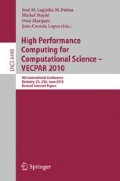Abstract
A hybrid linear solver based on the Schur complement method has great potential to be a general purpose solver scalable on tens of thousands of processors. For this, it is imperative to exploit two levels of parallelism; namely, solving independent subdomains in parallel and using multiple processors per subdomain. This hierarchical parallelism can lead to a scalable implementation which maintains numerical stability at the same time. In this framework, load imbalance and excessive communication, which can lead to performance bottlenecks, occur at two levels: in an intra-processor group assigned to the same subdomain and among inter-processor groups assigned to different subdomains. We developed several techniques to address these issues, such as taking advantage of the sparsity of right-hand-sides during the triangular solutions with interfaces, load balancing sparse matrix-matrix multiplication to form update matrices, and designing an effective asynchronous point-to-point communication of the update matrices. We present numerical results to demonstrate that with the help of these techniques, our hybrid solver can efficiently solve large-scale highly-indefinite linear systems on thousands of processors.
Access this chapter
Tax calculation will be finalised at checkout
Purchases are for personal use only
Preview
Unable to display preview. Download preview PDF.
References
Community Petascale Project for Accelerator Science and Simulation (ComPASS), https://compass.fnal.gov
Amestoy, P., Rouet, F.-H., Uçar, B.: On computing arbitary entries of the inverse of a matrix. In: SIAM Workshop on Combinatorial Scientific Computing (CSC 2009), Monterey (2009)
Barrett, R., Berry, M., Chan, T.F., Demmel, J., Donato, J., Dongarra, J., Eijkhout, V., Pozo, R., Romine, C., van der Vorst, H.: Templates for the solution of linear systems: Building blocks for the iterative methods. SIAM, Philadelphia (1994)
Duff, I., Koster, J.: The design and use of algorithms for permuting large entries to the diagonal of sparse matrices. SIAM J. Matrix Anal. Appl. 20(4), 889–901 (1999)
Gaidamour, J., Henon, P.: HIPS: a parallel hybrid direct/iterative solver based on a schur complement. In: Proc. PMAA (2008)
Gilbert, J.: Predicting structure in sparse matrix computations. SIAM J. Matrix Analysis and Applications 15, 62–79 (1994)
Giraud, L., Haidar, A., Watson, L.T.: Parallel scalability study of hybrid preconditioners in three dimensions. Parallel Computing 34, 363–379 (2008)
Laboratoire Bordelais de Recherche en Informatique (LaBRI). SCOTCH - Software package and libraries for graph, mesh and hypergraph partitioning, static mapping, and parallel and sequential sparse matrix block ordering, http://www.labri.fr/perso/pelegrin/scotch/
Lee, L.-Q., Li, Z., Ng, C.-K., Ko, K.: Omega3P: A parallel finite-element eigenmode analysis code for accelerator cavities. Technical Report SLAC-PUB-13529, Stanford Linear Accelerator Center (2009)
Li, X., Demmel, J.: SuperLU_DIST: A scalable distributed-memory sparse direct solver for unsymmetric linear systems. ACM Trans. Mathematical Software 29(2), 110–140 (2003)
Mathematics and Computer Science Division, Argonne National Laboratory. The portable, extensible, toolkit for scientific computation (PETSc), http://www.mcs.anl.gov/petsc
Slavova, T.: Parallel triangular solution in an out-of-core multifrontal approach for solving large sparse linear systems. PhD thesis, Institut National Polytechnique de Toulouse, Toulouse, France (2009)
Smith, B., Bjorstad, P., Gropp, W.: Domain Decomposition. Parallel Multilevel Methods for Elliptic Partial Differential Equations. Cambridge University Press, New York (1996)
Yamazaki, I., Li, X., Ng, E.: Preconditioning schur complement systems of highly-indefinite linear systems for a parallel hybrid solver. In: The Proceedings of the International Conference on Preconditioning Techniques for Scientific and Industrial Applications, Numer. Math. Theor. Meth. Appl., vol. 3(3), pp. 352–366 (2009)
Yamazaki, I., Li, X., Ng, E., Rouet, F.-H., Uçar, B.: Combinatorial issues in a paralle hybrid linear solver. In: SIAM Workshop on Parallel Processing (PP 2010), Seatle (2010)
Author information
Authors and Affiliations
Editor information
Editors and Affiliations
Rights and permissions
Copyright information
© 2011 Springer-Verlag Berlin Heidelberg
About this paper
Cite this paper
Yamazaki, I., Li, X.S. (2011). On Techniques to Improve Robustness and Scalability of a Parallel Hybrid Linear Solver. In: Palma, J.M.L.M., Daydé, M., Marques, O., Lopes, J.C. (eds) High Performance Computing for Computational Science – VECPAR 2010. VECPAR 2010. Lecture Notes in Computer Science, vol 6449. Springer, Berlin, Heidelberg. https://doi.org/10.1007/978-3-642-19328-6_38
Download citation
DOI: https://doi.org/10.1007/978-3-642-19328-6_38
Publisher Name: Springer, Berlin, Heidelberg
Print ISBN: 978-3-642-19327-9
Online ISBN: 978-3-642-19328-6
eBook Packages: Computer ScienceComputer Science (R0)

